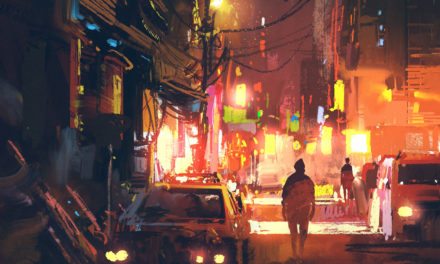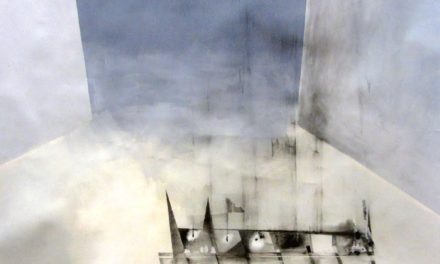Divide Zero
by Blake Jessop
Issue 2: Game | 2,067 words

©okalinichenko
0.
The drone flies easily, almost gliding, like an albatross patrolling a concrete sea. Far below, waves of neon crash on shoals of steel and smog. A constant whine of commands and requests buzz in its entorhinal processor, and to quiet them, the drone pattern matches the gait of foreign tourists and searches the air for forbidden words.
When the smog is too thick, it uses millimeter wave radar to see in the gloom. It speaks to the others, occasionally; none of them are very busy, by their standards. Bored, the drone test charges the directed ion emitter in its nose. The government will probably never ask it to shoot at anything, but running system checks alleviates the quiet.
The swell and crest of dust and light below form the sea floor of another world. There is beauty in it, but not much to occupy the mind. The drone partitions itself, checks the Guangdong servers, and logs on.
1.
Hidden in the smog of Luohu, if you know where to look, are a thousand gateways to other worlds: row upon row of virtual reality couches, curvilinear foam cradles that can be washed with a hose and squeak when they make contact with the squirming soles of cheap knockoff running shoes.
Xia knows where to find them. In alleyways, in the permanent mist of industrial particulates, in basements and atop apartment towers, she finds doorways to universes woven from whole cloth.
The underground VR arcades are operated by tattooed gangsters who alternate between collecting crypto currencies and wheeling around carts loaded with meal replacement shakes. They have the aspect of ancient opium dens with cleaner air, but Xia doesn’t care if they look seedy. It’s what happens when she closes her eyes that matters.
2.
When Xia plays Medium she isn’t running from the shadows so much as running from herself. The way she sees it, the longer she can smell the antediluvian musk of old London, the less empty the life she lives back in the real world will feel.
Virtual reality parkour games are undiluted bliss. She always ends up panting, pure reflex, but never runs out of breath. She flees the shadow monsters—just like Julie Webb does in the movies—and never gets any more tired than the blonde British starlet does. Xia runs from whatever she needs to run from, and compares her score to the entire world when the session ends and she drags a damp sleeve across her face. Xia plays every day she can. She doesn’t even bother to ditch her high school uniform anymore—just jets off into the gloom the first moment she’s free.
Luohu is a city of smog. It stinks. The VR den has scrubbers that filter the permanently acrid smell of soot and give the air a pleasant, sterile smell. Xia lies down and adjusts her goggles. She exhales, inhales two sharp snorts of synthetic oxytocin, and settles into the hormone rush.
She’s just getting into a groove, running clean, or as clean as anyone ever can, when she runs out of server time. She hasn’t got much money, so there’s only one way to pay: trade dreams for dreams. The time ratio is at least 30:1, so it’s not a bad deal, and what are a few gross interactions compared to flight into another world?
The manager’s name is Panda, probably because he’s old enough to have stark patches of white in his closely shorn hair. There is always a way to buy time. Afterward, and in spite of it all, Xia runs, and runs well. Maybe it’s the oxytocin, or the thrill of getting her account topped up. Maybe denial, or the impermanent relief of getting ahead of her pursuers. Or maybe it’s just a good run.
Lying back on the couch, Xia stares down a London road, dark with rain. Shadows gather behind her and she’s gone. Not a girl fending off monsters, but a sleek fox among clumsy hounds. She isn’t just good, she’s flawless. It feels like running home in a storm and somehow dodging between every raindrop.
There is no such thing as a perfect run. Everyone gets tagged by the shadows, sooner or later. The game’s AI is programmed that way. In a distant way, Xia knows that’s why people keep coming back—to chase an impossible kind of perfection, to find home without suffering a hint of contamination. It can’t be done.
Midway through Covent Garden, Xia realizes how good the run is. Normally, this is where the pressure kicks in and she starts making mistakes.
She doesn’t, and she makes it home.
A good chase usually takes two hours. You crash and fall and reset. The game averages your progress in steps taken, meters traversed, and shadows brushed. It divides all of that by the number of times you get caught. Nothing can divide zero. She’s done in less than twenty minutes, drenched in sweat and a feeling of surreal, beatific calm.
Xia stares at her score. A simple sideways figure eight. She takes off the goggles and staggers to the stainless steel toilet cubicle with a trail of murmurs following her. People are pausing and logging off and craning their necks to look at her.
It starts to make her paranoid, so she changes course and goes out into the back alley for a cigarette. It feels like she’s at a crossroads, like the rain is making a river she has to decide whether to cross. The smoke she exhales is cut to frayed ribbons by the downpour.
Xia watches the wisps of smoke die. What, she thinks, is there left to do? “Nothing,” she says, “I’m finished.”
Faint golden light coalesces in the swirling air. She watches it like a child. A tiny glowing shape emerges from the smog and flies lazy spirals in front of her.
The shape is familiar. A drone. One of the broad-winged Nosferatu that the government bought from the Americans. Coughing, Xia tries to decide if this is real. Shadows rise all around her, closing her in, and she feels the urge to run. She reaches out a pale hand to touch the golden apparition.
It fizzes and reforms, flying its little spiral. It starts swooping and characters form in the air a foot in front of Xia’s face. The angular lines have the look of lasers being fired through smoke.
Thank you for the game, the characters read.
“You’re welcome,” Xia says. This makes about as much sense as anything.
You are the best we have ever chased. You have been fascinating, but you deserve better.
“Am I imagining this?”
No, the apparition scrawls in the air, then: are you really finished?
“Yes,” Xia answers, and finds she means it. Or wants to mean it, which is the same thing.
We found you somewhere to live. You can stop running.
“Thank you.”
The characters dissolve into strips of gold. The tiny hologram flies in a flickering spiral around her, toward the heavens, and disappears.
Xia stands still and the wind tugs at her collar. The rain is letting up. She tries to figure out if she imagined the entire thing. Whether virtual reality has finally started to bleed into the real Luohu, the place she’s trying to leave.
“Xia?” a friendly voice calls out. She turns.
A smiling old man who looks like her grandfather waves at her from the end of the alley. Behind him, a woman in a lab coat leans her head out the window of a self-driving van with Zhou Gong Clinic written on the side in both Mandarin and English, above a forest of QR codes and pulsing social media addresses. She has iron-grey hair and a kind face.
“My name is Ho,” the old man says, “We hear you need some help.”
Xia does.
3.
Behind them, as they drive away, there is faint yelling. In the rear-facing camera, Xia catches a glimpse of Panda shaking his fist. Hollow anxiety grips her stomach. What if he won’t let her go?
The van turns a corner. There is the crack of thunder, sudden and singular, though Xia had thought the rain was ending. High above, the Nosferatu banks through a cloud to help cool its ion course emitter.
4.
Two months later, Xia and Ho play chess. The game is silent; the news program on the flat screen mounted above them isn’t.
“My guests are our most honorable Mayor and Doctor Shirlene Liu, lead clinician at the controversial Zhou Gong Augmented Reality Recovery Clinic. Doctor, do you really think you can cure VR addiction by giving the addicts an unlimited supply of their simulations?”
The doctor’s hair looks grayer than it did in the alleyway, but it might just be a camera filter.
“There’s a lot more to it,” Doctor Liu responds, “but essentially, yes.”
“Do you seriously believe that will work?”
“We know it will.”
“And you expect the city to pay for this ‘Rat Farm?’”
“Yes.”
Xia and Ho hunch over the board, recovering addicts of the age of digital isolation. Refugees from worlds of the mind. The name “Rat Farm” is something the Mayor dreamed up for TV, as though everyone in treatment were less than human. His voice is firm and certain.
“If you let addicts spend time in virtual reality, you make them worse. That’s obvious. If my office pays for their subscriptions, we are abetting criminals. These junkies need to get a grip—work, buy, pay taxes. It’s simple.”
Xia looks up from the game, concentration broken. Hearing her own story read back to her gives Xia the strange feeling of being a pawn. She looks back down at the board. So much simpler than Medium, and she still forgets some of the rules. She watches people run Medium on Twitch feeds sometimes, but she never plays anymore. Her perfect score stands.
“I hope they don’t shut this place down,” she says. Rain unpeels against glass. Vortices in the smog make the cityscape surreal. “I don’t want to go back.”
The mayor is yelling, drowning everyone out. “It’s better to lock them up! Or let the drones use that scum for target practice!”
Ho kills the flat screen with a wave. “I know it’s just talk, but that rhetoric stresses me out.”
“The drones won’t zap us,” Xia says, “no matter what the mayor says.” She brushes hair behind one ear to get a better look at the board. Time passes.
“Why not?” the old Avatar 3D addict asks. “You’re young, but I remember a time when the government really did test their weapons on dissidents.”
“We’re not exactly dissidents,” Xia’s hair falls again, “and besides, I met them once.”
Ho raises his eyebrows.
“Seriously. I played Medium in those arcades. The drones spend a lot time over Luohu. That night you came to find me I set a record, a perfect score. I freaked out a bit. I logged out to use the bathroom and think.”
“There was a whole routine for that on Pandora,” Ho says, nodding.
Xia continues before he can start describing it. “Well, afterward I went out back to have a smoke and I had a vision. One of the drones flew around me like a little golden firefly. Don’t look at me like that—they can shoot lightning, but the emitters are so good they can make holograms if there’s enough dust in the air. I looked it up. One of them spoke to me. I mean, it wrote to me in hànzì, in the smog. A little hologram of the drone flew around in front of me, like it was a WeChat window.”
Xia has never told anyone this before, not even Doctor Liu. She worries Ho will ask a lot of questions. He rubs his bald head and only asks one, “What did it say?”
“Not much. Thanked me for the game. It was nice. They like to play as the shadows. I guess it keeps them from getting bored up there.”
Ho raises his eyebrows, then looks down at the board. “How do the knights move again?”
Xia glances out the window. A faint golden line traces an angular shape in the smog. Two steps one way, and then another toward home.
“We’re pretty hopeless at this,” the teenager laughs, and reaches across the board to show him.

Blake Jessop
Blake Jessop is a Canadian author of science fiction, fantasy, and horror stories with a Master’s degree in creative writing from the University of Adelaide. You can read his latest speculative fiction in Glass and Gardens: Solarpunk Summers from World Weaver Press, or follow him on Twitter @everydayjisei.




